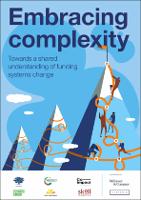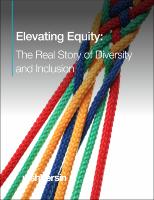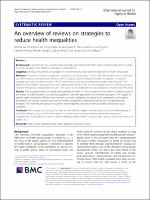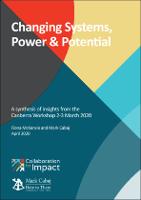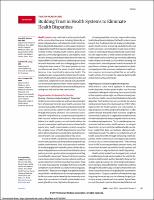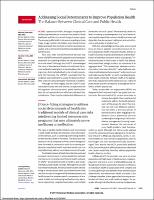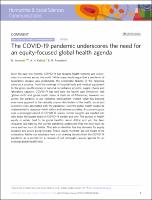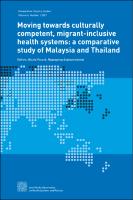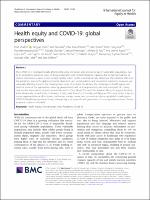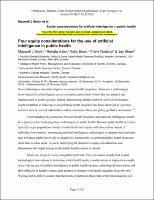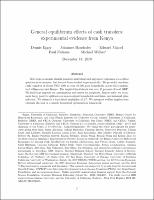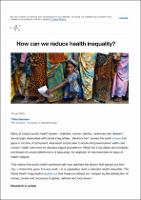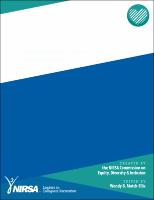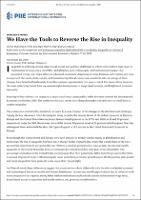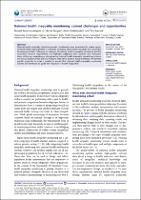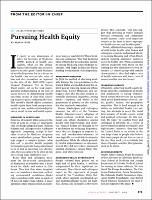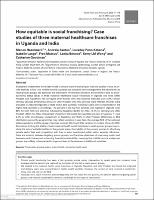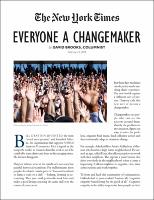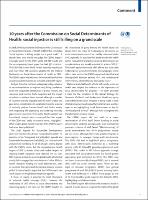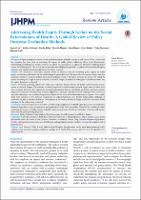1.02.02 Health in All Policies: Recent submissions
Embracing complexity Towards a shared understanding of funding systems change
(2020-01)
The report is the result of collaboration between Ashoka and McKinsey & Company, as well as social entrepreneurs from Catalyst 2030, Co-Impact, Echoing Green, Schwab and Skoll and SystemIQ.
How can systems change across the world be financed more effectively? How can change be better supported for the benefit of society? “Embracing complexity – Towards a shared understanding of funding systems change” provides donors and investors, as well as charitable initiatives and organizations, with answers to these questions. A clearly defined vision...
An overview of reviews on strategies to reduce health inequalities
(2020-12)
Background: Governments are incentivized to develop and implement health action programs focused on equity to ensure progress with effective strategies or interventions. Objective: Identify and synthesize strategies or interventions that facilitate the reduction of health inequalities. Methods: A systematic search strategy was carried out up until August 2019 in MEDLINE (Ovid), Embase (Elsevier), Cochrane Database of Systematic Reviews, LILACS, Scopus, Scielo and Epistemonikos. In addition, a snowball strategy was used. Literature reviews (LRs)...
Changing Systems, Power & Potential
(2020-03)
Mark Cabaj, President of the Canadian consulting company From Here to There and an Associate of Tamarack – An Institute for Community Engagement, worked with CFI to deliver a two-day workshop in March 2020 on Changing Systems, Power and Potential.
CFI Network member Fiona McKenzie observed and synthesised the learnings, discussions and perspectives into a report which captures contributions from both presenters and participants.
The result is a blend of concepts, frameworks, applications, hints and common threads that emerged about efforts to...
Building Trust in Health Systems to Eliminate Health Disparities
(JAMA, 2019-07-09)
The COVID-19 pandemic underscores the need for an equity-focused global health agenda
(2021-12)
Over the past few months, COVID-19 has ravaged health systems and economies in countries across the world. While many would argue that a pandemic of respiratory disease was predictable, the systematic failures of the response came as a surprise. From the shortage of hospital beds and medical equipment to the gross insufficiencies in national surveillance systems, supply chains and laboratory capacity, COVID-19 has laid bare the health care limitations that ‘global north’ and ‘global south’ share. A stark set of differences, however, run across ...
Moving towards culturally competent, migrant-inclusive health systems: a comparative study of Malaysia and Thailand
(the Asia Pacific Observatory on Health Systems and Policies, 2021)
Migrants are seldom included in policy discussions on the provision of health care, and in country policy reforms towards health for all. In addition, evidence on health care for migrant populations to inform and guide policy makers is limited. This Comparative Country Study (CCS) uses mixed-method approaches to analyse the extent to which two middle-income countries – Thailand and Malaysia, have culturally competent, migrant-inclusive health systems. The countries have taken different approaches to developing a migrant-inclusive health system....
Health equity and COVID-19: global perspectives
(2020-12)
The COVID-19 is disproportionally affecting the poor, minorities and a broad range of vulnerable populations, due to its inequitable spread in areas of dense population and limited mitigation capacity due to high prevalence of chronic conditions or poor access to high quality public health and medical care. Moreover, the collateral effects of the pandemic due to the global economic downturn, and social isolation and movement restriction measures, are unequally affecting those in the lowest power strata of societies. To address the challenges to...
General Equilibrium Effects of Cash Transfers: Experimental Evidence from Kenya
(National Bureau of Economic Research, 2019-12)
How large economic stimuli generate individual and aggregate responses is a central question in economics, but has not been studied experimentally. We provided one-time cash transfers of about USD 1000 to over 10,500 poor households across 653 randomized villages in rural Kenya. The implied fiscal shock was over 15 percent of local GDP. We find large impacts on consumption and assets for recipients. Importantly, we document large positive spillovers on non-recipient households and firms, and minimal price inflation. We estimate a local fiscal multip...
How can we reduce health inequality?
(2015-01-19)
Equity, Diversity & Inclusion: A resource guide for Leaders in Collegiate Recreation
(NIRSA Commission on Equity, Diversity & Inclusion, 2019-02)
The publication, Equity, Diversity & Inclusion: A resource guide for Leaders in Collegiate Recreation, compiles foundational concepts, research-driven best practices, and case studies to help campus recreation professionals develop competencies around EDI – for their own personal and professional growth, as well as for their departments. The publication includes the following:
Introduction to equity, diversity, and inclusion and the NIRSA EDI Identity Wheel.
Definitions for a broad range of terminology associated with the nine identities focus...
We Have the Tools to Reverse the Rise in Inequality
(PIIE Peterson Institute for International Economics, 2019-11)
National health inequality monitoring: current challenges and opportunities
(Informa UK Limited, trading as Taylor & Francis Group, 2018-12-03)
National health inequality monitoring needs considerably more investment to realize equityoriented health improvements in countries, including advancement towards the Sustainable Development Goals. Following an overview of national health inequality monitoring and the associated resource requirements, we highlight challenges that countries may encounter when setting up, expanding or strengthening national health inequality monitoring systems, and discuss opportunities and key initiatives that aim to address these challenges. We provide specific...
Pursuing Health Equity
(Health Affairs, 2017-06)
How equitable is social franchising? Case studies of three maternal healthcare franchises in Uganda and India
(Oxford University Press in association with The London School of Hygiene and Tropical Medicine, 2018-04-01)
Substantial investments have been made in clinical social franchising to improve quality of care of private facilities in low- and middle-income countries but concerns have emerged that the benefits fail to reach poorer groups. We assessed the distribution of franchise utilization and content of care by socioeconomic status (SES) in three maternal healthcare social franchises in Uganda and India (Uttar Pradesh and Rajasthan). We surveyed 2179 women who had received antenatal care (ANC) and/or delivery services at franchise clinics (in Uttar Prad...
Everyone a changemaker
(The New York Times, 2018-02-09)
Addressing Health Equity Through Action on the Social Determinants of Health: A Global Review of Policy Outcome Evaluation Methods
(Kerman University of Medical Sciences, 2018-02-06)
Background: Epidemiological evidence on the social determinants of health inequity is well-advanced, but considerably less attention has been given to evaluating the impact of public policies addressing those social determinants. Methodological challenges to produce evidence on policy outcomes present a significant barrier to mobilising policy actions for health equities. This review aims to examine methodological approaches to policy evaluation of health equity outcomes and identify promising approaches for future research. Methods: We conduct...

